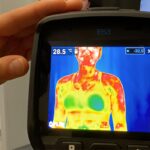A groundbreaking proof-of-concept study has identified a sex-specific panel of 10 proteins capable of detecting 18 different early-stage cancers across various major organs. Published in BMJ Oncology, the research could pave the way for a new generation of screening tests for early cancer detection.
The study, led by researchers aiming to address the global challenge of cancers lacking effective screening tests, highlighted the limitations of existing methods, including invasiveness, expense, and low accuracy for early-stage disease. With cancer accounting for 1 in 6 deaths worldwide, effective screening tools are crucial.
The researchers collected plasma samples from 440 individuals diagnosed with 18 cancer types and 44 healthy blood donors. Employing advanced technology, they measured over 3000 proteins associated with cancer chemical pathways. A panel of 10 sex-specific proteins emerged as promising indicators of cancer, demonstrating differential expression between men and women.
While individual proteins showed moderate accuracy in detecting early-stage disease, the combined panel exhibited high accuracy, particularly in identifying stage I cancers. The sex-specific proteins achieved 93% sensitivity for stage 1 cancers in men and 84% in women, with 99% specificity for both genders. The panel of 150 proteins also successfully identified the tissue of origin in over 80% of cases.
The study emphasized the importance of low-level proteins in detecting pre-cancerous and early-stage disease before substantial systemic impacts occur. While acknowledging study limitations, including a relatively small sample size, the researchers see the sex-specific protein panel as a strong candidate for population-wide screening, addressing current limitations in existing techniques.
In a linked editorial, Dr. Holli Loomans-Kropp from The Ohio State University noted that despite challenges, sex-specific detection panels might offer a strategy for improving the sensitivity and specificity of multi-cancer early detection tests, potentially expediting advancements in the field. The study provides a promising foundation for future research and the development of effective screening tools for diverse cancers.










